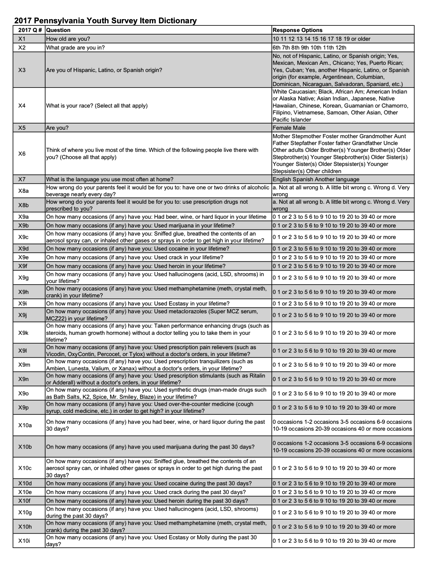Thank you to D.O. for this Guest Blog
Urgent: Unauthorized collection and distribution of PA student data fall 2017 and ACTION ITEM at the end
Urgent: Unauthorized collection and distribution of PA student data fall 2017 and ACTION ITEM at the end
Unbeknownst to parents across Pennsylvania, many middle and high school students will be administered the intrusive and disturbing PAYS (Pennsylvania Youth Survey) between September 11 and November 22, 2017.
What is PAYS (Pennsylvania Youth Survey)
The survey questions can be found HERE
This information from PAYS is used to identify changes in behavior and substance abuse, and to identify needs in the community. The data is also used in grant applications. That all sounds noble and good. Unfortunately, there are three insidious problems with this survey.
Government intrusion
The 2017 PAYS is worse than ever. The survey (as usual) asks not just what the student does or thinks, but what parents, siblings, their closest friends, and neighbors do and think and feel, how close the student is with his parents and family members, and whether he goes to church. It effectively asks the student to spy on other people. You can see a copy of the 2017 PAYS survey questions <here>.
Trigger warning advised
Some of the questions are so heartless that they should carry a trigger warning. If a student is already struggling, this survey could have devastating consequences. A survey is not a compassionate way to deal with serious crises in a young person’s life. Struggling students need people who care, not a dehumanizing survey tallying their heart break. The PAYS is taken anonymously, but the questions are excruciatingly personal in nature.
Lack of Consent
The third major issue is that this survey is given without written parental consent, which is required by state law.
The third major issue is that this survey is given without written parental consent, which is required by state law.
The law: According to Title 22, Chapter 4, Item 4(d) “School entities shall adopt policies to assure that parents or guardians have the following: (5) The right to have their children excluded from research studies or surveys conducted by entities other than a school entity unless prior written consent has been obtained.”
In practice: The rights of guardians are being blatantly disregarded as the push for data collection continues. Per the law, surveys require a parent to provide written consent.However, the PDE incorrectly tells school districts to use a passive opt in method, which is to say that everyone is opted in unless the parent chooses to opt out. The PDE also fails to tell districts that districts are responsible for notifying all parents of the upcoming survey and for providing opt out instructions. (One cannot presume a parent has opted in if the parent was not even notified of the survey.)
Most parents across the state only find out about the survey when their children come home and tell them about the upsetting survey they were forced to take, after the damage has already been done. Even then parents are unaware of their right to opt out of future surveys. As a result, very few parents across the state have had the opportunity to be informed and opt out.
Although the Pennsylvania Department of Education (PDE) is responsible for statewide administration of the PAYS (Pennsylvania Youth Survey) and provides the procedures to the school districts, the PDE takes no responsibility for disseminating incorrect information.The PDE has stated that they will not revise their policies and that it’s not their fault if school districts fail to obtain the required written permission, even if they did so under the advice of the PDE. In the PDE’s eyes, the school districts are ultimately accountable for complying with state law, not the PDE.
This affects all current students in Pennsylvania in 6th, 8th, 10th, and 12thgrades in districts that have opted to participate (given biannually), as well as students in 6th through 12th grades in districts that receive certain federal community grants (annually).
Urgent call to action
1
|
Opt out
|
If your child is in 6th through 12th grades, opt them out. You can email your childs principal’s and teacher and request that your child is opted out of the PAYS survey. It just takes a minute! That way you can be sure that your student will not participate in this tragic data grab.
|
2
|
Share
|
Inbox all of your friends who are middle school or high school parents and tell them the can opt out, and share this blog post via social media.
|
3
|
Advocate
|
Tell <xxx> that the PDE must comply with state education law and obtain written consent before surveying school-aged children.
|
4
|
Forward your email to the superintendent of your school district and add a link to this blog post reminding them that they are responsible for following state law.
|
Keep it simple. If we each take just a few minutes to do this, we will have a huge impact. Together we can make a difference for our children.






